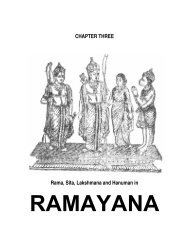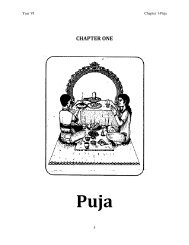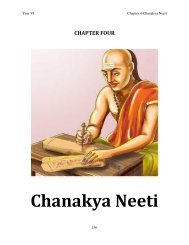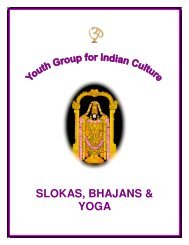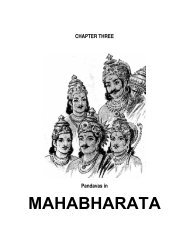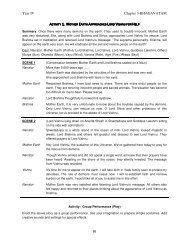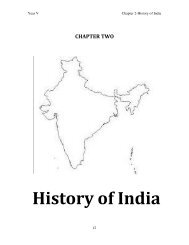Year III-Chap.1-SLOKAS - Ygic.us
Year III-Chap.1-SLOKAS - Ygic.us
Year III-Chap.1-SLOKAS - Ygic.us
Create successful ePaper yourself
Turn your PDF publications into a flip-book with our unique Google optimized e-Paper software.
CHAPTER ONE<br />
<strong>SLOKAS</strong><br />
(PRAYERS)
<strong>Year</strong> <strong>III</strong><br />
Chapter 1-<strong>SLOKAS</strong><br />
LORD GANESHA<br />
Gajaananam bhoota-ganaadi-sevitam Kapittha-jambu-phalasaara-bhakshitam<br />
Uma-sutam shoka-vinaasha-kaaranam namaami vigneshvara paada-pankajam.<br />
Meaning:<br />
He who has the face of an elephant, one who is worshipped by the Bhootha ganam, He<br />
who eats the essence of kapitha and Jumbu fruits, He who is the son of Uma Devi (Parvati)<br />
and He who alleviates the ill feelings in <strong>us</strong>. O! Lord Vigneshvara (Ganesha, the Lord of<br />
obstacles) who is an embodiment of all the above, we offer our namaskarams (salutations)<br />
at your divine feet.<br />
Yasya dviradavaktraadyaah-paarishadyaah-parah-shatam<br />
Vignam nighnanti satatam vishvaksenam tamaashraye. 2.<br />
Meaning:<br />
I also surrender at the feet of Vishvaksena (Ganesha) who always removes all hindrances<br />
and whose repute is widespread in innumerable assemblies and more by his being prayed<br />
to constantly.<br />
Ganesha as Vishvaksena (the all-conquering) is sometimes shown with four hands, wearing<br />
Shankha, Chakra and Gada in three hands and the fourth exhibiting the Tarjanimudra<br />
(threatening finger pose). The right leg is <strong>us</strong>ually shown hanging down from the pedestal.<br />
Ganesha/Vishvaksena is worshipped at the beginning of any undertaking, to avoid<br />
obstacles. We begin the Vishnu Sahasranaama stotram (prayer with 1000 names of Vishnu)<br />
with Ganesha prayers, Shukhlaam bharadharam vishnum… and the above 2 nd sloka.<br />
6
<strong>Year</strong> <strong>III</strong><br />
Chapter 1-<strong>SLOKAS</strong><br />
GODDESS SARASVATI<br />
Om Sri Sarasvatyai namaha.<br />
Gayatri<br />
Yaa kundendu t<strong>us</strong>haara-haara-dhavalaa yaa shubhra-vastraa-vritaa<br />
Yaa veenaa-varadanda mandita-karaa yaa shveta padmaasanaa<br />
Yaa brahmaachyuta shankara prabhritibhir devaih-sadaa vanditaa<br />
Saa maam paatu sarasvatee bhagavatee nih-shesha-jaadyaa-pahaa. 1.<br />
Gayatri<br />
Om Vaakdevyai cha Vidmahe Brahmapatnai cha Dheemahi<br />
Tannah Sarasvatee Prachodayaat. 2.<br />
Meaning:<br />
1. The one, who is dazzlingly white as the kundha flower, the moon, or a snow flake, who is<br />
robed in bright white clothes, who is adorned with the hands holding the veena, who is<br />
seated in a white lot<strong>us</strong>, who is worshipped by all gods including Brahma, Achyuta (Vishnu)<br />
and Shankara (Shiva), may that Goddess Sarasvati, the dispeller of ignorance, protect me.<br />
2. Om! We meditate on the consort of Brahma, the goddess of speech, may Sarasvati<br />
brighten our intellect.<br />
7
<strong>Year</strong> <strong>III</strong><br />
Chapter 1-<strong>SLOKAS</strong><br />
GODDESS LAKSHMI<br />
Om Sri Mahaalakshmyai namaha.<br />
Gayatri<br />
Lakshmeem Ksheerasamudra-raaja-tanayaam shreeranga-dhaameshvareem<br />
Daaseebhoota-samasta-devavanitaam lokaika-deepaankuraam<br />
Shreemanmanda kataaksha-labdha-vibhava brahmendra-gangaadharaam<br />
Tvaam trailokya-kutumbineem sarasijaam vande mukundapriyaam. 1.<br />
Sarasijanayane sarojahaste dhavalataraam-shuka-gandhamaalya-shobhe<br />
Bhagavati harivallabhe manojne tribhuvanabhootikari praseeda mahyam. 2.<br />
Gayatri<br />
Om Mahaadevyai cha Vidmahe Vishnupatnyai cha Dheemahi<br />
Tanno Lakshmeeh Prachodayaat. 3.<br />
Meaning:<br />
1. Goddess Lakshmi, who is the daughter of the king of the ocean of milk, who is the<br />
Goddess of Sriranga (Vishnu), who is served by all the goddesses in heaven, who is the<br />
guiding light of the world, who has the glory of blessing of Brahma, Indra and Gangadhar<br />
(Shiva), who has taken on with care all the three worlds as her family, who appeared on a<br />
lot<strong>us</strong> and who is the beloved of Mukunda (Vishnu) – I salute you.<br />
8
<strong>Year</strong> <strong>III</strong><br />
Chapter 1-<strong>SLOKAS</strong><br />
2. Goddess Lakshmi, who has lot<strong>us</strong> eyes, who has lot<strong>us</strong> in her hands, who has silken robe<br />
and shines with fragrant garland, the goddess, the consort of Hari (Vishnu), who knows our<br />
mind, who makes all the three worlds prospero<strong>us</strong>, please be graceful to me.<br />
3. Om! We meditate on the consort of Vishnu, the great goddess, may Lakshmi grant <strong>us</strong><br />
wealth and prosperity.<br />
---------------------------------------------------------------------------------------------------------------------------------------------------------------------------------------------<br />
GODDESS DURGA<br />
Om Sri Durgaayai namaha.<br />
Sarvaswaroope sarveshe sarvashaktisamanvite<br />
Bhaye-bhayasthrahi no devi durge devi namostute 1.<br />
Namaste sharanye shive saanukampe<br />
Namaste jagadvyaapike vishvaroope<br />
Namaste jagadvandya-paadaaravinde<br />
Namaste jagattaarini traahi durge. 2.<br />
Meaning:<br />
1. My salutations to you, O Durga Devi, you are the personification of all forms,<br />
the goddess of all, possessor of all energy, kindly protect <strong>us</strong> from all fears.<br />
2. Salutations to Durga Devi who is sharanya, shive (consort of Shiva who is<br />
a<strong>us</strong>picio<strong>us</strong>) and kind; Salutations to you who is the whole universe and has<br />
the vishvaroopa (magnificent form); Salutations to you who has the feet that is<br />
worshipped by all in this world; Salutations to you who protects this world<br />
from all dangers, O Durga Devi protect <strong>us</strong>.<br />
9
<strong>Year</strong> <strong>III</strong><br />
Chapter 1-<strong>SLOKAS</strong><br />
LORD VISHNU<br />
Om Namo Naaraayanaaya.<br />
Namah samastabhootaanaam aadibhootaaya bhoobhrute<br />
Aneka rooparoopaaya vishnave prabhavishnave 1.<br />
Sashankhachakram sakireetakundalam sapeetavastram saraseeruhekshanam<br />
Sahaaravakshasthala shobhika<strong>us</strong>tubham namaami vishnum shirasaa<br />
chaturbhujam 2.<br />
Meaning:<br />
1. Salutation to Lord Vishnu, the origin of all living beings and the s<strong>us</strong>tainer of<br />
the world, the one with many forms, who is all pervasive and who is selfeffulgent.<br />
2. I salute to that Lord Vishnu bowing down my head, who is four armed, who is<br />
sporting the shankha=conch (Panchajanya), the chakra=disc<strong>us</strong><br />
(Sudarshana), the crown and ear drops, who is robed with yellow clothes,<br />
who has eyes like lot<strong>us</strong>, whose chest is decorated with the Ka<strong>us</strong>tubha gem<br />
and is also adorned with garlands.<br />
10
<strong>Year</strong> <strong>III</strong><br />
Chapter 1-<strong>SLOKAS</strong><br />
LORD NARASIMHA<br />
Gayatri<br />
Om Ugram veeram mahaavishnum jvalantam vishvatomukham<br />
Nrisimham bheeshanam bhadram mrityumrityum namaamyaham. 1.<br />
Gayatri<br />
Om Nrisimhaaya Vidmahe Vajranakhaaya Dheemahi<br />
Tannah Simhah Prachodayaat. 2.<br />
Meaning:<br />
1. Salutations to Lord Narasimha who is ferocio<strong>us</strong> towards the demon Hiranyakasipu,<br />
who is brave, the great Lord who is all pervasive, who appeared like flames of fire<br />
in front of the demon, whose face contain all gods (devas), who removes all fear<br />
including the fear of death and who gives immortality.<br />
2. Om! We meditate on Lord Narasimha, the lion-faced God whose nails are sharp<br />
and strong like iron, may he inspire <strong>us</strong>.<br />
It is very important that one should say this mantra without any error and with utmost purity<br />
of one’s mind, body and soul.<br />
11
<strong>Year</strong> <strong>III</strong><br />
Chapter 1-<strong>SLOKAS</strong><br />
LORD HYAGREEVA<br />
Gyaanaanandamayam devam nirmala spadikaakruthim<br />
Aadaaram sarva vidyaanaam Hyagreevam upaasmahe. 1.<br />
Gayatri<br />
Om Vaageeshvaraaya Vidmahe Hayagreevaaya Dheemahi<br />
Tanno Hamsah Prachodayaat. 2.<br />
Meaning:<br />
1. Vidyaarambam-studies begin with a prayer to Sri Hyagreeva (Lord with the<br />
horse’s face/neck), who is the presiding deity for all knowledge. We pray to<br />
him to bless <strong>us</strong> with all the knowledge.<br />
2. Om! We meditate on Lord Hyagreeva, the horse-faced God who is the Lord<br />
of speech, may he inspire <strong>us</strong>.<br />
Lord Hyagreeva is another form of Lord Vishnu.<br />
He is the god of learning, akin to goddess Sarasvati.<br />
Two demons Madhu and Kaitabha had stolen the Vedas and hidden them under water. Lord<br />
Vishnu took the form of Hyagreeva, dived to the bottom of the ocean and rescued them after<br />
killing the demons.<br />
He is shown in the human form, with the horse’s head, possessing four or eight arms,<br />
carrying the vario<strong>us</strong> weapons and emblems of Vishnu.<br />
12
<strong>Year</strong> <strong>III</strong><br />
Chapter 1-<strong>SLOKAS</strong><br />
LORD SHIVA<br />
Om namah Shivaaya.<br />
Karpoora-gauram karuna-avataaram samsaara-saaram bhujagendra-haaram<br />
Sadaa-vasantam hridaya-aravinde bhavam bhavaanee-sahitam namaami.<br />
Meaning:<br />
I salute to that Ishvara along with Bhavani (Shiva and Parvati) who is as white as Karpoor<br />
(camphor), an incarnation of compassion, the essence of this world, who wears a<br />
bhujagendra (snake or serpent) around his neck and is ever present in the lot<strong>us</strong> abode of<br />
our hearts.<br />
-----------------------------------------------------------------------------------------------------------------------------------------------------------------------------------------------------<br />
LORD DAKSHINAMURTI (GURU)<br />
Shree Gurubhyo namaha.<br />
13
<strong>Year</strong> <strong>III</strong><br />
Chapter 1-<strong>SLOKAS</strong><br />
Mauna-vyaakhyaa-prakattita-parabrahma-tatvam yuvaanam<br />
Varshishtthaan-teva-sad-rishi-ganair-aavritam brahma-nishtthaihi<br />
Aachaaryendram karakalita-chinmudram-aanandaroopam<br />
Svaatmaa-raamam mudita-vadanam dakshinaamoorti-meede. 1.<br />
Meaning:<br />
I praise Lord Dakshinamurti, the ageless one, who expounded the truth of non -dual Brahman<br />
through silence, who is surrounded by aged disciples, who ever abides in Brahman, who is the<br />
best among teachers, whose hand is held in the gesture of chin -mudra (jnana mudra), who is the<br />
embodiment of joy, who revels in himself, and who has a smiling countenance.<br />
Gukaaro-andhakaarovai rukaaras-tannivartakaha<br />
Andhakaara-nirodhitvaat gurur-ityabhidheeyate. 2.<br />
Meaning:<br />
The syllable “gu” stands for darkness (of ignorance), “ru” represents its remover. A guru is so<br />
called beca<strong>us</strong>e he removes the darkness (of ignorance).<br />
Na Gurordhikam tatvam na gurordhikam tapaha<br />
Na gurordhikam jnaanam tasmai shreegurave namaha. 3.<br />
Meaning:<br />
Salutations to that respected Guru, as there is no truth greater than Guru, no greater penance than<br />
Guru and no greater knowledge than Guru.<br />
Dhyaanamoolam gurormoortim poojaamoolam guroh padam<br />
Mantramoolam gurorvaakyam mokshamoolam guroh kripaa. 4.<br />
Meaning:<br />
The Guru is the form of knowledge, the feet of the Guru are the basis of worship, the wo rds of the<br />
Guru are the basis of mantra and the mercy of the Guru is the basis of liberation.<br />
14
<strong>Year</strong> <strong>III</strong><br />
Chapter 1-<strong>SLOKAS</strong><br />
LORD SUBRAHMANYA<br />
Om Sri Saravanabhavaaya namaha.<br />
Mayooraadhi-roodam mahaavaakya-goodam<br />
Manohaari-deham mahachchitta-geham<br />
Maheedeva-devam mahaaveda-bhaavam mahaadeva-baalam bhaje lokapalam<br />
Meaning:<br />
I salute the Lord who protects the whole universe, who is seated on a peacock, who<br />
is the essence of the great Mahaa vaakyaas, who is handsome, who is dwelling in<br />
the heart of great sages, who is worshipped by the Vedas, who is the quintessence<br />
of four Vedas (=Upanishads) and who is the son of Lord Shiva.<br />
Lord Subrahmanya is the son of Shiva and Parvati and the<br />
younger brother of Ganesha.<br />
When Subrahmanya was a very little boy he taught the meaning of<br />
“OM” (Pranava mantra) to his own father Lord Shiva whispering on<br />
his ears. Shiva accepted him as guru and listened to the<br />
exposition as a devoted disciple. Hence Subrahmanya is also<br />
called Swaminathan. This incident is depicted in a famo<strong>us</strong> temple<br />
of his in Swamimalai where he is called Swaminatha, and the<br />
temple is one of the six hill temples of Lord Muruga (another name<br />
of Lord Subrahmanya) and all of them are located in the southern<br />
state Tamilnadu, in India.<br />
15
<strong>Year</strong> <strong>III</strong><br />
Chapter 1-<strong>SLOKAS</strong><br />
LORD HANUMAN<br />
Om Sri Hanumate namaha.<br />
Yatra yatra Raghunatha-keertanam tatra tatra kruta-mastakaanjalim<br />
Baashpavaari-paripoorna-lochanam Maarutim namata raaksha-saantakam<br />
Meaning:<br />
In all those nooks and corners, where the Lord of Raghunath (Rama) is sung about, in all such<br />
nooks and corners is he (Hanuman), in Anjali, with tears flooding from the eyes. Salutations to the<br />
son of Marut (Vayu=wind-god), who is the end of all evil ones.<br />
-----------------------------------------------------------------------------------------------------------------------------------------------------------------------------------------------------<br />
LORD KUBERA<br />
Om Raajaadhiraajaaya prasahyasaahine namo vayam vaisravanaaya kurmahe<br />
sa me kaamaan kaamakaamaaya mahyam kaameshvaro vaisravano dadaatu<br />
kuberaaya vaisravanaaya mahaaraajaaya namaha.<br />
Meaning:<br />
We offer salutations unto Vaisravana (the son of Visrava, i.e. Kubera), the king of kings, whose<br />
nature it is to help without any purpose of his own. May Vaisravana, the lord of deities, give me, the<br />
seeker of desires, what I desire. Salutations unto the great Lord Kubera, the son of Visrava.<br />
Lord Kubera, the king of the Yakshas (a kind of demigods) is famo<strong>us</strong> as the lord of wealth.<br />
He rules over the northern quarter of the universe.<br />
The famo<strong>us</strong> Kubera yantra is worshipped for prosperity.<br />
The above mantra on Lord Kubera is also called the aarati mantra. It is chanted when aarati<br />
is shown for any God.<br />
16
<strong>Year</strong> <strong>III</strong><br />
Chapter 1-<strong>SLOKAS</strong><br />
LORD SUDARSHANA<br />
(Lord Vishnu’s powerful chakra)<br />
(Sri Sudarshana Yantra)<br />
Om Kleem Krishnaaya Govindaaya Gopee jana vallabhaaya<br />
Paraaya parama Pur<strong>us</strong>haaya Paramaathmane<br />
Para Karma mantra Yantra owshadhastra<br />
Sastraani samhara samhara, mruthyor mochaya mochaya<br />
Om namo Bhagavate mahaa Sudarshanaaya<br />
Deepthre, jwaalaa pareethaaya sarvadik kshobana karaaya<br />
Humpatu brahmane Param jyothishe Swaahaa.<br />
Meaning:<br />
O Lord Krishna, beloved of all devotees, O Supreme Soul of the Universe, O Universal<br />
Self, please save me from dangers of any form and remove the fear of death, O Supremely<br />
Effulgent Maha Sudarshana which shineth and protects <strong>us</strong> in all the eight directions, O<br />
Glorio<strong>us</strong> Light, Salutations to thee !<br />
The above mantra is chanted many times while performing the Sudarshana homam (havan).<br />
Prayers to Sri Sudarshanamurti and the famo<strong>us</strong> Sudarshana Yantra is believed to alleviate<br />
serio<strong>us</strong> diseases, avert great dangers, redeem lost wealth and prevent obstacles in any<br />
one's good efforts to succeed. It is very important that one should say this mantra without<br />
any error and with utmost purity of one’s mind, body and soul.<br />
17
<strong>Year</strong> <strong>III</strong><br />
Chapter 1-<strong>SLOKAS</strong><br />
LORD SURYA<br />
Aadityahrudayam punyam sarva shatru vinaashanam<br />
Jayaavaham japennityam akshayam paramam shivam. 1.<br />
Sarvamangala maangalyam sarvapaapa pranaashanam<br />
Chintaashoka prashamanam aayur varthanamuthamam. 2.<br />
Namah poorvaaya giraye pashchimaayaatraye namaha<br />
Jyotirganaanaam pataye dinaathipataye namaha. 3.<br />
Meaning:<br />
1. The heart of Aditya (Lord Surya, the son of Aditi), which is highly virtuo<strong>us</strong>, destroyer<br />
of all enemies, bestower of victory and is imperishable, should be repeatedly and<br />
constantly meditated upon.<br />
2. The heart of Aditya is highly a<strong>us</strong>picio<strong>us</strong> and will exterminate all sins; it will remove<br />
all worries and grief and will enhance the longevity of life and is excellent.<br />
3. Salutations to Lord Surya, who is the mountain of the east and the mighty hill of the<br />
west, the lord of the hordes of light and the lord of the day.<br />
The above slokas are taken from stotram called Aditya Hrudayam which is mentioned in<br />
Yuddha Kanda in Valmiki Ramayana. Sage Agastya described the glories of Lord Surya and<br />
advised Lord Rama to pray Lord Surya to win Ravana in battle and this constitutes the<br />
stotram ‘Aditya Hrudayam’.<br />
18
<strong>Year</strong> <strong>III</strong><br />
Chapter 1-<strong>SLOKAS</strong><br />
LORD CHANDESVARA<br />
Neelakanta padaambhoja parisphurita maanasa<br />
Shamboh sevaabhalam dehi chandesvara namostute.<br />
Meaning:<br />
Salutations to Lord Chandesvara, whose mind is always fixed at the feet of Param eshvara,<br />
grant the fruitfulness of me worshipping Lord Shiva.<br />
Lord Chandesvara (also called Chandikesvara), a human devotee was raised to a stat<strong>us</strong> of a<br />
deity, by Lord Shiva beca<strong>us</strong>e of his intense devotion. He is <strong>us</strong>ually installed in every Shiva<br />
temple in the north-eastern corner, facing south. Devotees believe that he can act as a<br />
messenger and mediator interceding with Lord Shiva on behalf of the devotees. Hence<br />
supplication before him is a duty of every devotee visiting the Shiva temples.<br />
-----------------------------------------------------------------------------------------------------------------------------------------------------------------------------------------------------<br />
GODDESS ANDAL<br />
Shree Vishnuchittha Kulanandana Kalpavalleem<br />
Shree Rangaraaja Harichandana yoga dr<strong>us</strong>hyaam<br />
Saakshaath Kshamaam Karunaya Kamalaamivaanyaam<br />
Godhaam ananya Sharana: Sharanam Prapadhye.<br />
19
<strong>Year</strong> <strong>III</strong><br />
Chapter 1-<strong>SLOKAS</strong><br />
Meaning:<br />
Godaa Piraatti (Andal/Bhudevi) is the wish-granting Kalpaka tree in flower garden of the<br />
kulam(family) of Sri Vishnu Chitthar; She is most beautiful as she gives <strong>us</strong> her<br />
darshan(appearance) as the Karpaka creeper united with her Lord Sri Rangarajan standing<br />
majestically as the Harichandana tree in that Nandavanam (garden); She is the incarnation<br />
of Bhoomi Devi (Mother Earth) known for her a<strong>us</strong>picio<strong>us</strong> qualities of forbearance; indeed,<br />
Godai is the embodiment of forbearance; When it comes to the quality of Her Mercy, Godai<br />
is a veritable Mahaalakshmi (Kamalaa). I, who has no other refuge seek her as my sole<br />
refuge.<br />
-----------------------------------------------------------------------------------------------------------------------------------------------------------------------------------------------------<br />
LIFE HISTORY OF ANDAL DEVI<br />
A devout brahmin named Vishnuchittha lived in SriVilliputthur, a town near Madurai in<br />
South Indian state of TamilNadu. His daily duties included procuring flowers for the worship<br />
of the Lord at the local Lord Vishnu temple. One morning, as he went about his b<strong>us</strong>iness, he<br />
discovered a baby girl lying under a tulasi plant in his flower garden. Having no family of his<br />
own, Vishnuchittha felt it was God's grace that gave him this child and named her Godai, or<br />
"gift of Mother Earth." Filled with joy, he took her home and raised her as his own. On<br />
Pooram (Poorva phalguni) Nakshatram (star) day of Tamil month Aadi (mid July-mid Aug.),<br />
we celebrate the birthday of Andal Devi.<br />
Godai grew up in an atmosphere of love and devotion. Vishnuchittha doted on her in every<br />
respect, singing songs to her about his Beloved Krishna, teaching her all the stories and<br />
philosophy he knew, and sharing with her his love of Tamil poetry. The love Vishnuchittha<br />
had for his Beloved Lord intensified further in his daughter, and before long she was<br />
passionately in love with Lord Krishna. Even as a child, Godai made up her mind to marry<br />
none but the Lord of Brindavana, and ref<strong>us</strong>ed to think of any human being in similar terms.<br />
She imagined what it would be like to be His bride, playing the role of His beloved, enjoying<br />
His presence. Unknown to her father, she adorned herself daily with the flower garland he<br />
prepared for the Lord at the temple. After admiring her reflection and thinking of herself as<br />
His ideal bride, she would put the garland back for her father to take to the temple and offer<br />
to the Lord.<br />
One day, Vishnuchittha noticed a strand of Godai's hair on one of the garlands. Shocked<br />
and saddened by this desecration of what was meant only for the Lord, he scolded Godai<br />
for her mis<strong>us</strong>e of the garland and discarded it. He carefully prepared a new one and offered<br />
it to the Lord, begging His pardon all the while.<br />
That night, the Lord appeared to Vishnuchittha in his dream and asked him why he<br />
discarded Godai's garland instead of offering it to Him. He told Vishnuchittha that He<br />
missed the scent of Godai's body in the flowers and that He preferred them that way and<br />
asked would he please continue to give the garlands once worn by Godai? Overcome with<br />
emotion, Vishnuchittha awoke and cried tears of both joy and remorse. It dawned on him<br />
that his daughter was someone whose love of God was so intense and pure that even h e<br />
had not comprehended its extent. Her spiritual greatness was such that the Lord Himself<br />
wished to share her presence. From that day on, she became known as "Andal", the girl<br />
who "ruled" over the Lord and as “Sudikkoduttha Sudarkodi”, the lady who offered<br />
garlands to God after wearing them first.<br />
Andal blossomed into a beautiful young woman as she came of marriageable age. When<br />
20
<strong>Year</strong> <strong>III</strong><br />
Chapter 1-<strong>SLOKAS</strong><br />
asked to marry, however, she stubbornly ref<strong>us</strong>ed, saying that she would only agree to<br />
marry her Lord. Vishnuchittha despaired, wondering what was to become of his daughter.<br />
One night, Lord Ranganatha, the Lord Narayana laying on his serpent bed, at the great<br />
temple town of Srirangam near Tiruchirappalli in TamilNadu, appeared in his dream and<br />
asked that Andal be sent to Him in all her wedding finery. Simultaneo<strong>us</strong>ly, the Lord<br />
appeared before the priests at Srirangam and asked them to prepare for the coming of<br />
Andal. Vishnuchittha once again was filled with both joy and sadness; joy that his beloved<br />
daughter would attain her goal, but sadness at losing her at the same time. He arranged for<br />
Andal's journey in a palanquin to Srirangam in full bridal glory.<br />
Andal waited with excited anticipation as the wedding party approached Lord Ranganatha's<br />
shrine. As they entered the temple, she jumped out of the palanquin, unable to restrain<br />
herself any longer. Running into the temple sanctum, she embraced Lord Ranganatha and<br />
disappeared in a blaze of glory, having joined her Lord. She was only fifteen at the time.<br />
Andal’s union with the Lord is celebrated as Koodaaravalli in the tamil month Margazhi<br />
(Danurmaasam-mid Dec.-mid Jan.). We offer sweet pongal to Sri Andal and Lord Vishnu and<br />
share the Prasad with all other devotees. At Vishnuchitthar's request, the Lord agreed to a<br />
traditional marriage ceremony which was performed at Srivilliputthur on the Uthiram (Uthira<br />
phalguni) nakshatram (star) day of tamil month Panguni (Meena Phalguna-mid March-mid<br />
April) and is even now celebrated in all Vishnu temples on the same day every year.<br />
Andal is one of the twelve alwars and best loved poet-saints of the Tamils. Pio<strong>us</strong> tradition<br />
reckons her to be the veritable descent of Bhoomi Devi (Mother Earth) in bodily form to<br />
show humanity the way to His lot<strong>us</strong> feet.<br />
Andal as Bhu Devi is present in all Vishnu temples, in India and elsewhere, next to her Lord,<br />
as she always desired.<br />
Today, the tulasi garden in which she was found is preserved in Sri Villiputthur.<br />
Vishnuchittha's ho<strong>us</strong>e, adjacent to Lord Vishnu's temple, has been converted into a temple<br />
in honor of Andal and contains the well in which she admired her reflection while wearing<br />
the Lord's garlands.<br />
Most of all, however, Andal is remembered for her poetry, in which she often strikes<br />
autobiographical notes about her love for her Lord. She describes herself as a young<br />
girl, still not fully mature, pining away for Him. She beseeches her friends, the god<br />
of love, and even animals for help in her quest to attain Him. Finally, she describes<br />
her good fortune of being the daughter of Vishnuchittha (who later came to be known as<br />
Perialwar), the best of the devout, who lives in SriVilliputthur and adores the Lord. Her<br />
famo<strong>us</strong> work is the Tiruppaavai, a tamil poem of thirty verses in which Andal imagines<br />
herself to be a cowherd girl during the incarnation of Lord Krishna. She yearns to serve<br />
Him and achieve happiness not j<strong>us</strong>t in this birth, but for all eternity, and describes the<br />
religio<strong>us</strong> vow (paavai) that she and her fellow cowgirls will take for this purpose.<br />
Devotees chant one verse of Tiruppaavai everyday, from those 30 verses in order, during<br />
Danurmaasam (mid Dec.-mid Jan.).<br />
21
<strong>Year</strong> <strong>III</strong><br />
Chapter 1-<strong>SLOKAS</strong><br />
COW<br />
Sarvakaamadughe devi sarva-teerthaa-bhishechinee<br />
Paavane surabhishreshtte devi tubhyam namostute.<br />
Meaning:<br />
The goddess (cow) who grants <strong>us</strong> all our wishes, who gives <strong>us</strong> all the benefits as of bathing<br />
in all holy waters, who makes <strong>us</strong> pure by removing all our sins, the supreme Kamadhenu<br />
(divine cow), my salutations to you.<br />
Cow is considered sacred; it is believed that all the gods and goddesses are within the cow<br />
so worshipping the cow is like worshipping all the gods and goddesses and the picture<br />
above represents the same.<br />
------------------------------------------------------------------------------------------------------------ -----------------------------------------------------------------------------------------<br />
BILVA<br />
Tridalam trigunaakaaram trinetram cha triyaayutam<br />
Trijanma paapasamhaaram eka bilvam shivaarpanam<br />
22
<strong>Year</strong> <strong>III</strong><br />
Chapter 1-<strong>SLOKAS</strong><br />
Meaning:<br />
Offer the trifoliate Bilva leaf which destroys the sins of three births, to Lord Shiva, the<br />
three-eyed Lord having the trident in His hand.<br />
It is considered very a<strong>us</strong>picio<strong>us</strong> to worship Lord Shiva (Linga) with Bilva leaves; we can see<br />
Bilva tree in many Shiva temples.<br />
-----------------------------------------------------------------------------------------------------------------------------------------------------------------------------------------------------<br />
TULASI<br />
Yanmoole Sarvateerthaani yanmadhye sarvadevataaha<br />
Yadagre sarva vedaascha tulaseem-tvaam namaamyaham.<br />
Meaning:<br />
I bow down to the Tulasi at whose base are all the holy places, on whose middle<br />
reside all deities and at whose top are all the Vedas.<br />
Sri Tulasi - the goddess is the beloved of Lord Vishnu; One time Krishna’s wif e Satyabhama<br />
tried to balance the scale with Lord Krishna himself on one plate and all the wealth<br />
including jewels on another; she could not balance it and Krishna was weighing heavier<br />
than the wealth. Seeing this, Rukmini, the Krishna’s wife placed a tula si leaf instead of<br />
jewels when Krishna weighed equal to the Tulasi leaf. Such was the greatness of Tulasi.<br />
We can see Tulasi plants in almost all Vishnu temples. Many people have Tulasi plants at<br />
their homes too and worship her. Sri Tulasi is the remover o f sins and giver of virtues.<br />
23
<strong>Year</strong> <strong>III</strong><br />
Chapter 1-<strong>SLOKAS</strong><br />
ASHWATHA TREE<br />
Moolato brahmaroopaaya madhyato vishnuroopine<br />
Agratah shivaroopaaya vriksharaajaaya te namaha.<br />
Meaning:<br />
Salutations to Vriksharaja (the king of trees), who takes the form of Brahma at the<br />
base (roots), Vishnu in the middle (bark) and Shiva at the top (branches).<br />
The Ashwatha tree also known as Pipal tree or Banyan tree or Bodhi tree is regarded as the<br />
most holy tree since it is believed that its base stands for Brahma, trunk for Vishnu and the<br />
top for Shiva and each and every leaf for all devas.<br />
This Ashwatha tree is quite remarkable beca<strong>us</strong>e it grows both upwards as well as from top<br />
to bottom. The branches themselves morph into roots, so even if the original tree decays<br />
and perishes its branches underneath are young and continue to enclose the parent. It is<br />
said to be eternal.<br />
------------------------------------------------------------------------------------------------------------------------------------------------------------------------------- ----------------------<br />
NIGHT PRAYER<br />
Kara-charana-krutam vaak-kaayajam karmajam vaa<br />
Shravana-nayana-jam vaa maanasam vaa aparaadham<br />
Vihitam-avihitam vaa sarvametat kshamasva<br />
Jaya jaya karunaabdhe shree mahaadeva shambho.<br />
24
<strong>Year</strong> <strong>III</strong><br />
Chapter 1-<strong>SLOKAS</strong><br />
Meaning:<br />
Lord, kindly forgive all the omissions and commissions born of my eyes, ears, mind,<br />
and organ of speech, or done by my hands and feet, and the omissions and<br />
commissions in the performance of my duties, either enjoined or prohibited. Glory to<br />
you, the Great Lord Shiva, who is the ocean of kindness and the ca<strong>us</strong>e of happiness.<br />
Before going to sleep, one ends the day with this prayer. One asks the lord for forgiveness<br />
for inappropriate actions that one may have knowingly or unknowingly done during the day.<br />
These actions may be physical, verbal, or mental. Prayer itself is an action that has its own<br />
result in the form of punya, which neutralizes the paapas (sins) born of errors of omission<br />
and commission. Prayer is an appreciation of one’s limitations, and a request for the<br />
blessings of the Lord for inner maturity and strength.<br />
-----------------------------------------------------------------------------------------------------------------------------------------------------------------------------------------------------<br />
PEACE<br />
Om shanno mitrah sham varunaha / shanno bhavatvaryamaa / sanna indro<br />
bruhaspatihi<br />
Shanno vishnururukramaha / namo brahmane / namaste vaayo<br />
Tvameva pratyaksham brahmaasi / tvameva pratyaksham brahma vadishyaami<br />
Rutam vadishyaami satyam vadishyaami / tanmaamavatu tadvaktaaramavatu<br />
Avatu maam avatu vaktaaram / om shaantih shaantih shaantihi.<br />
Meaning:<br />
May the Sun God (Mitra) give <strong>us</strong> a<strong>us</strong>picio<strong>us</strong>ness. May the ocean God (Varuna) give<br />
<strong>us</strong> a<strong>us</strong>picio<strong>us</strong>ness. May the Lord of Manes (Aryama) give <strong>us</strong> a<strong>us</strong>picio<strong>us</strong>ness. May<br />
the king of Gods (Indra) and the preceptor of Gods (Brihaspati) give <strong>us</strong><br />
25
<strong>Year</strong> <strong>III</strong><br />
Chapter 1-<strong>SLOKAS</strong><br />
a<strong>us</strong>picio<strong>us</strong>ness. May the all pervasive s<strong>us</strong>tainer of creation, Lord Vamana<br />
(Urukrama) give <strong>us</strong> a<strong>us</strong>picio<strong>us</strong>ness. Salutations to the creator (Brahma). Salutations<br />
to you, O Wind God (Vayu). You indeed are the perceptible truth. I understand you to<br />
be the perceptible truth. I declare you to be the right understanding. I understand you<br />
to be truthfulness in speech. May he protect me. May he protect the teacher. May he<br />
protect me. May he protect the teacher. Om peace, peace, peace.<br />
This is the opening verse of the Taittireeya Upanishad, from the Krishna Yajur Veda. The<br />
subject matter of the Upanishads is Brahma-vidya, knowledge of the self. Self-knowledge<br />
reveals the essential nature of the self as being non-separate from the Lord.<br />
A seeker seeks blessings of vario<strong>us</strong> devatas for gaining this knowledge. The study of the<br />
Upanishads is not undertaken without the help of a teacher who can unfold Brahma -vidya.<br />
In this prayer, one seeks protection for oneself and the teacher so that there may be no<br />
hindrance in the fulfillment of this pursuit. This prayer may be recited by the student before<br />
undertaking any study.<br />
26



